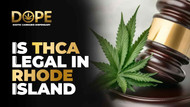Is THCA Legal in Rhode Island? 2025 Laws & Regulations
Jul 17th 2025
Is THCA Legal in Rhode Island?
Understanding the legality of THCA (tetrahydrocannabinolic acid) in Rhode Island is essential for consumers, patients, and businesses navigating the cannabis landscape in 2025. With cannabis laws evolving rapidly and THCA sitting in a legal gray area, staying informed helps ensure compliance and confidence in your choices.
This guide breaks down the legal status of THCA, its relationship to THC, and how Rhode Island’s cannabis laws affect the sale, possession, and use of THCA products.
What Is THCA and Why Does It Matter?
THCA is a non-psychoactive cannabinoid found in raw or freshly harvested cannabis. It’s the precursor to THC (tetrahydrocannabinol)—the well-known compound responsible for the “high” people associate with marijuana use.
When THCA is heated through smoking, vaping, or baking, it undergoes decarboxylation, a process that converts it into Delta-9 THC. While raw THCA doesn’t cause intoxication, its potential to turn into psychoactive THC is the main reason it falls under regulatory scrutiny.
Recent studies suggest that THCA may offer anti-inflammatory, anti-nausea, and neuroprotective benefits, which is why it’s gaining attention in wellness and medical cannabis communities.
Is THCA Legal in Rhode Island in 2025?
THCA is not explicitly legalized as a standalone compound in Rhode Island law. Its legality depends on two key factors:
- Source of the THCA – Hemp-derived THCA is treated differently from marijuana-derived THCA.
- Post-conversion THC content – If THCA can convert to more than 0.3% Delta-9 THC, it may be considered illegal under state law.
While medical and recreational cannabis are legal in Rhode Island, the state categorizes THCA as a controlled marijuana product if its THC levels exceed legal thresholds after decarboxylation.
Hemp-derived THCA products, however, are conditionally legal if they meet the 2018 Farm Bill’s requirement of less than 0.3% Delta-9 THC by dry weight.
Current Cannabis Laws in Rhode Island (2025)
Recreational Use
- Legal for adults 21 and older
- Up to 1 ounce allowed in public
- Up to 10 ounces allowed at home
- Adults may cultivate 6 cannabis plants (3 mature, 3 immature)
Medical Marijuana
- Legal since 2006
- Available to patients with qualifying conditions
- Products include oils, tinctures, edibles, and flower
- Sold through licensed dispensaries
THCA Classification
- Rhode Island treats THCA products as marijuana-derived if they:
- Originate from cannabis plants with more than 0.3% THC
- Have potential to produce illegal amounts of THC after heating
This classification means THCA may be subject to the same regulations as high-THC cannabis.
THCA and the 2018 Farm Bill
Under federal law, hemp-derived products containing less than 0.3% Delta-9 THC are legal.
This includes THCA, as long as the total THC content remains below the legal limit, even after decarboxylation.
Rhode Island largely aligns with these federal standards, allowing licensed retailers to sell compliant hemp-derived products.
Can THCA Show Up on a Drug Test?
Yes. THCA may trigger a positive drug test, especially if the test screens for cannabinoids in general.
Although some drug tests only target Delta-9 THC, many modern tests can detect THCA metabolites, particularly in sensitive workplace or government screenings.
Can You Buy THCA Flower Legally in Rhode Island?
Yes—but only under certain conditions.
- Consumers can legally purchase THCA flower in Rhode Island if:
- The product is derived from federally legal hemp
- It contains less than 0.3% total THC
- It is lab-tested and labeled accurately
However, most retail THCA flower currently on the market exceeds total THC limits after heating, making them legally questionable unless sold through licensed recreational or medical dispensaries.
Where to Buy Compliant THCA Products in Rhode Island
In Rhode Island, THCA flower products can be legally purchased through trusted and compliant sources, provided they meet state and federal THC thresholds.
You can buy THCA products from:
- Licensed medical cannabis dispensaries
- Adult-use recreational dispensaries
- Hemp retailers that provide Certificates of Analysis (COAs) to prove compliance with THC limits
- Online platforms like com, which offer lab-tested, hemp-derived THCA products shipped in accordance with federal and state laws
Whether you're shopping in person or online, it's critical to review the lab reports (COAs). These documents verify the product's Delta-9 THC content and total THC post-decarboxylation—ensuring you're buying legally compliant THCA flower.
Always purchase from reputable sellers that are transparent, certified, and up to date with Rhode Island’s cannabis laws.
The Future of THCA in Rhode Island
As of 2025, the future for THCA looks increasingly promising in Rhode Island.
- Legislative discussions tied to the updated Farm Bill may raise legal THC thresholds for hemp, expanding access to THCA products.
- Scientific interest in non-psychoactive cannabinoids continues to grow, pushing demand for THCA's anti-inflammatory and neuroprotective properties.
- Rhode Island remains committed to building a safe, regulated cannabis market—aiding both innovation and consumer protection.
However, the potential for THCA to convert into THC remains a legal sticking point. Until clearer federal or state legislation emerges, THCA will continue to be regulated based on its post-conversion psychoactivity.
Conclusion: Navigating THCA Legally and Safely in 2025
THCA’s legal status in Rhode Island remains complex but navigable in 2025.
With the state embracing both medical and recreational cannabis, opportunities for THCA usage are expanding—but only when products are sourced legally and remain within THC limits post-decarboxylation.
As with all cannabinoids, it’s essential to:
- Stay updated on local and federal laws
- Purchase from licensed, transparent sellers
- Read product labels and lab reports carefully
By following these guidelines, Rhode Islanders can confidently explore THCA's wellness potential while staying on the right side of the law.

